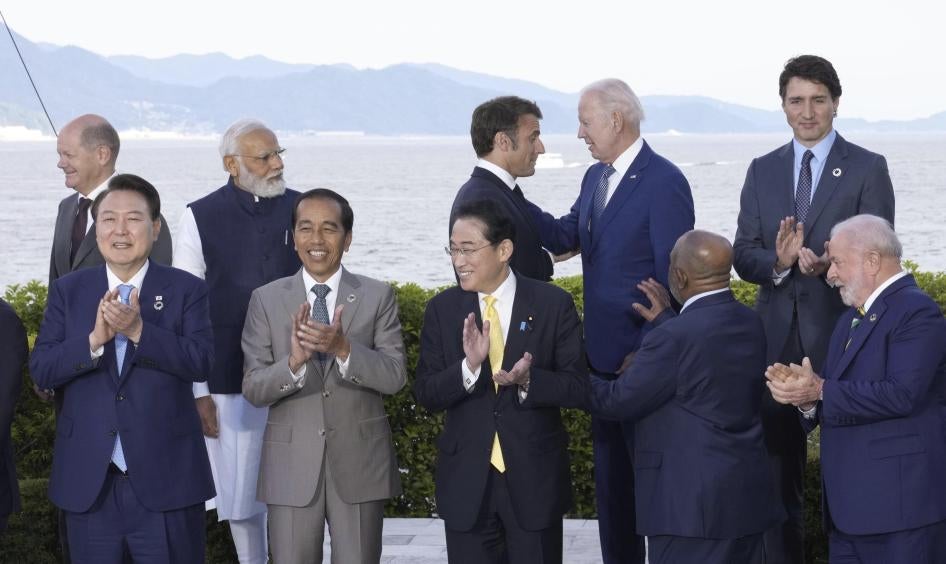During British colonial rule, people often expressed aspirations for a free and independent India through songs and poetry. One, popular in the Bengali language, was by the lawyer-lyricist Atul Prasad Sen, who wrote of a day when India “would take a primary seat at the world assembly.”
Many Indians will be proud that this year, India holds the presidency of the Group of 20 (G20) nations and chairs the Shanghai Cooperation Organization. India is a member of the Quadrilateral Security Dialogue, known as the Quad, and recently joined a summit of the world’s most advanced economies, the Group of Seven (G7). Prime Minister Narendra Modi’s calendar is booked for the next several months with visits around the world, including Paris and Washington, and a number of world leaders are visiting India.
As one of the fastest-growing economies with democratic credentials, demographic heft and military clout, India is now a major player on the global stage. But now that its voice is recognized, it is crucial for India to use it for the global good.
Unfortunately, India’s emerging international role has coincided with rising authoritarianism at home. The Bharatiya Janata Party (BJP)-led government is using draconian laws to intimidate and arrest some activists, peaceful critics and independent journalists who express disagreement with government laws and policies. The government has enacted and enforced laws that systematically discriminate against minority Muslims and Christians.
BJP leaders frequently make speeches that can incite communal violence by their Hindu-majoritarian affiliate groups. Some authorities have effectively normalized violence through bias, punishing peaceful protests by religious minorities while failing to prosecute the pro-government supporters who assault them. After the government revoked its constitutional autonomy in 2019 and split the Muslim-majority Jammu and Kashmir province into two federally governed territories, Kashmiris continue to face repression.
Indian governments, in recent times, unwilling to risk bilateral relationships, have rarely played a major part in promoting respect for human rights in other countries, deeming them”internal affairs.” Now, the escalating abuses at home, with its angry and defiant response to criticism, can make the Modi government reluctant to risk a larger international role in promoting human rights. But that would come at a real cost for those around the world who would benefit from India taking up their cause.
India instead should set a positive example, as it did during the COVID-19 pandemic by supplying vaccines and equipment to many countries in the Global South. It should speak out against racism, entrenched colonial bias and hypocrisy in managing irregular migration and the climate crisis. It should demand that the right to health care holds primacy over Big Pharma making profits by holding at ransom life-saving vaccines and medicines. It should vocally help lead calls on the Taliban to end its brutal repression of women and girls in Afghanistan, and support Iranian women and men in their right to protest.
It should condemn the Chinese government’s crackdown on the rights of Tibetans and Uyghurs, and in Hong Kong. Instead of selling weapons parts and defense material to them, it should press for an end to the Myanmar junta’s crimes against humanity. It should not hesitate to call for the protection of civilians caught up in the conflicts in Ukraine and Sudan, and other places with a protracted crisis.
But if the Modi administration wants to be taken seriously on the world stage, it also needs to address its own abusive governance. If it wants global progress on women’s right to live without fear, violence and discrimination, it cannot tolerate the daily mistreatment that millions of Indian women endure, ignore alleged sexual harassment of its top women athletes, or approve the release of those convicted of gang-rape and murder for political expediency.
If it supports the rights of refugees around the world, it should not deny Rohingya and other Muslims from seeking asylum in India. To have credibility in standing up for minority rights elsewhere, it needs to stop the hate campaign against Muslims, Christians and Sikhs in India, and should protect Dalits and Adivasis.
These demands for reform are not unique. Human rights are universal, and each country has the responsibility to raise concerns about abuses elsewhere, and to address its own failures. India often decries Western double standards to abstain from decisions on global action to bring accountability and justice through United Nations resolutions. But respecting sovereignty cannot serve as an excuse for siding with abusive governments.
When world leaders gather — as they will when Modi hosts the G20 later this year — they often claim to be working together to resolve global challenges. Usually little is accomplished because in the interests of false unity, they adopt the lowest common denominator — positions on which everyone can agree. If India wants to be a world leader, it should promote the idea that solving problems requires confronting unpleasant truths, erratic policies and abusive ideologies that undermine the shared goals of universal human rights.
The second line of Atul Prasad Sen’s song promised that India would be great in both duty and deliverance. So when India’s prime minister joins his peers in the coming months, he should both speak and listen. He should act to end rights violations at home — and ask the same of other leaders.









